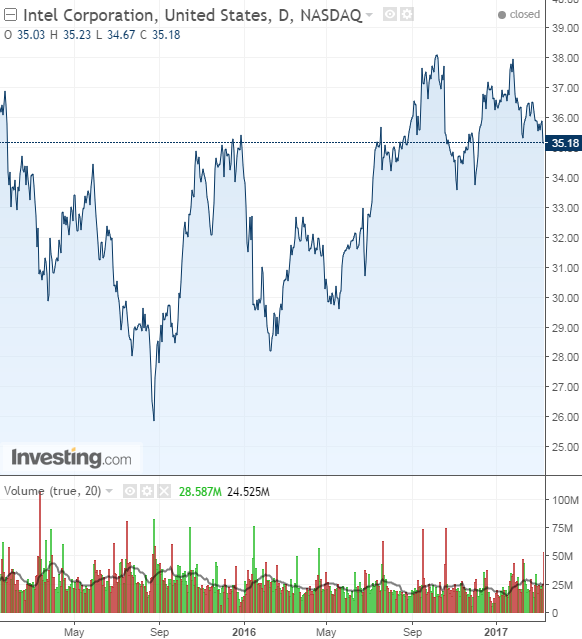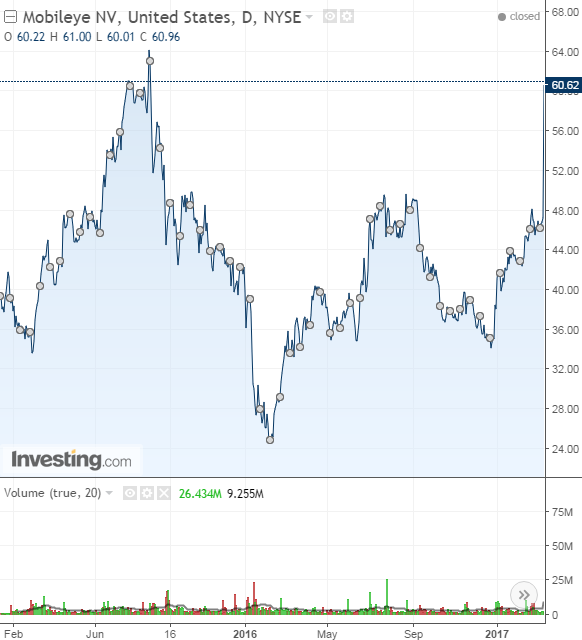by Clement Thibault

On Monday, Intel (NASDAQ:INTC) announced that it will be acquiring Mobileye (NYSE:MBLY), an Israeli company that produces chip-based systems including cameras for autonomous driving applications, for $15 billion dollars. This is Intel's second largest deal to date, after the acquisition of chip maker Altera in June 2015, for $16.7 billion dollars.
Big acquisitions often have long lasting impacts on a company, whether the expected synergies and hoped for vertical integration are realized from a successful purchase, or the company's bottom line and perhaps even core business are damaged in the unfortunate event of a failure to properly integrate and leverage the acquisition.
For that reason, big acquisitions are always a good time to reevaluate the acquirer and its market position.
Declining PC Business, Resurgent AMD
Intel's first segment is called CCG – Client Computing Group – and is responsible for what could be considered the retail aspect of Intel's business. This segment lumps together revenue related to desktop computers, notebooks, and mobile. At present, Intel still leads the desktop and notebook markets, with an estimated 80% of market share. Revenues from the mobile sub-segment are not as significant, since this portion of the market is dominated by Qualcomm (NASDAQ:QCOM), with Apple (NASDAQ:AAPL) and MediaTek shadowing Qualcomm.
While currently this is Intel's bread and butter, accounting for 54% of its total revenue, it's not expected to be a growth generator. Indeed, there are a few headwinds that could further derail this segment, which has seen a long, slow erosion over the past five years, with a 10% drop in revenue and segment operational income since 2011.
The first, and perhaps most significant factor is the declining PC market. Fewer and fewer PCs are being sold each year, as consumers move further into the mobile world and smartphones become more prominent in daily life. Unfortunately for Intel, their chips have only a small presence in this arena.
An additional factor is the resurgent Advanced Micro Devices (NASDAQ:AMD), and the launch of its new Ryzen processor. Without getting too technical, AMD has managed to catch up to Intel in the manufacturing process, and is now able to effectively compete against Intel's 14 nanometer chips. The big selling point is the price of AMD's Ryzen which is half of Intel's MSRP.
Intel's product roadmap suggests a new technological leap in 2018, but that also affords AMD ample time to re-establish itself in this market.
Data Centers
Currently, Intel controls about 99% of the Data Center business. Data centers are facilities that house networked computers, servers, and storage which are used by third party companies, in many cases to power cloud computing services. Right now Amazon (NASDAQ:AMZN), Microsoft and Alphabet (NASDAQ:GOOGL) use mostly Intel processors to power their data centers and cloud computing services. These centers are the 'brain trust' of a company's information systems.
Over the past few years, Intel's quasi monopoly in this area has allowed this segment to become the growth engine for the company as a whole, with 8% and 11% growth in the past two years respectively. However, as with Intel's dominance in consumer CPUs, the chip maker is under attack here as well.
Microsoft (NASDAQ:MSFT) recently partnered with Qualcomm to create an ARM-based (type of chip architecture) data center. Together the two companies could potentially create more energy-efficient servers, thereby providing an appealing alternative to Intel's data centers. This is not yet an up and running rivalry, but the declaration of intent and partnership between the two tech powerhouses is certainly something to be concerned about.
Mobileye Acquisition
The way we see it, there is one major reason for Intel's acquisition of Mobileye, and it is implied and alluded to throughout the two previous paragraphs. Intel sees its traditional sources of revenue becoming more and more threatened by a crowd of competitors, with one inevitable result—slower growth, or worse, declines in its two major segments.
On the plus side, Intel is keenly aware of the oncoming problems. Unfortunately Intel lacks a growth engine, something it hasn't been able to develop internally. Which is why it hopes buying Mobileye will provide the growth protection they so desperately need right now.
However, in our view, this acquisition is riddled with issues:
To begin with, Intel is a processing chip maker. That's its core business. And based on its market share up until now, it's been pretty successful.
As appealing as the self-driving automotive industry is, it's miles away from Intel's comfort zone. Intel will have to retain Mobileye's talent while at the same time compete in an entirely new and burgeoning industry if this marriage is to succeed.
In addition, while Mobileye is a market leader, it is far from the only player in the field. Tesla (NASDAQ:TSLA) and Nvidia (NASDAQ:NVDA are working together on autonomous vehicles while Google is working on it via its new company, Waymo. Even Apple has signaled that it's trying to grab a slice of the pie.
Which brings us to our third concern: $15 billion dollars is a hefty price for a company with $358M in revenues TTM and no guarantee of a future moat. Furthermore, the company was bought for a price per share it has already hit once before on the stock market.

This raises questions about the way Mobileye founders have valued their own company. After 19 years of running an active company, if you were a key Mobileye executive wouldn't you want to take out what you believe is maximum future value for the company you started and are now selling? If that's the impetus behind the Mobileye sale at this time, than Intel may have grossly overpaid for their latest acquisition.
And finally, Intel's success in integrating companies is questionable. The Altera deal hasn't quite worked out for Intel just yet. The purchase didn't provide the revenue boost Intel hoped it would. Plus, in February 2011, Intel bought McAfee security for $4.2 billion to create Intel Security—a business it is now divesting itself from. Intel doesn’t appear to have the know-how needed to acquire and successfully integrate companies.
There's no doubt that Intel is a solid company. Still, sometimes the market likes to underestimate the resolve and resources of established companies with growth problems—recent examples include IBM (NYSE:IBM) when it was trading under $120 and had a P/E of 10, and Apple when it traded at $90 with a P/E of 10. Though Intel lacks significant growth drivers, with a P/E of 16 the market isn't yet discounting it to the extent Apple and IBM were discounted at the time.
Unfortunately, we believe that the Mobileye acquisition isn't the solution for Intel. In fact, we think it is the wrong move at the wrong price. However, should the stock price dip and the P/E shift to the low 10 we'll consider taking a position in the company again.
